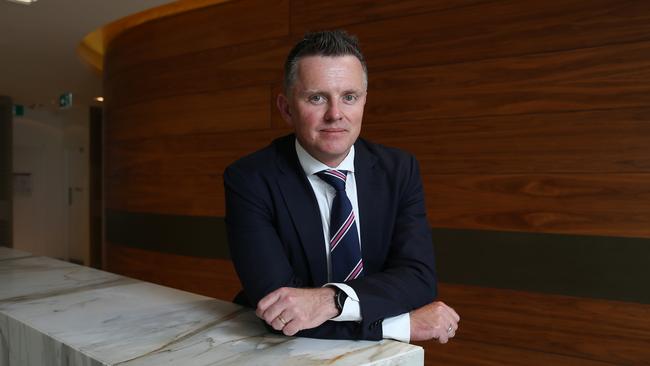Investors cheer expansionary budget stimulus
Investors welcomed a highly stimulatory federal budget with the local sharemarket surging to its highest level in almost five weeks.

Investors welcomed a highly stimulatory federal budget with the local sharemarket surging to its highest level in almost five weeks despite sharp falls on Wall Street.
In one of its most positive reactions to the budget in recent decades, the benchmark S&P/ASX 200 rose 75 points or 1.3 per cent to 6046.4, its highest daily close since September 3.
Whereas the US market fell sharply after President Trump abruptly ended talks on much-needed fiscal stimulus until after the November election, the local market rose for a third consecutive day to be up 4.2 per cent for the week and on track for its best week since May.
“We believe this pro-growth budget is supportive of a rising equity market,” said Macquarie’s Australian equity strategist Matthew Brooks. “Investors should continue to rotate to value and companies negatively impacted by COVID-19.”
The Australian dollar hit a six-day low of US70.96c as Wall Street dived and Australia’s three-year government bond yield hit a record low of 0.122 per cent as investors bet the Reserve Bank will further lower interest rates and possibly start quantitative easing program next month.
But shares of companies most reliant on the domestic economy — banks, retailers, property trusts, as well as construction and infrastructure-related companies — surged after the budget.
Westpac gained 2.6 per cent, Wesfarmers rose 2.5 per cent, Macquarie jumped 2.9 per cent, Woolworths rose 2 per cent, Seek gained 4.2 per cent, Lendlease rose 3.1 per cent, Cleanaway climbed 4.8 per cent and Adbri rose 3.2 per cent.
Economists said the bigger-than-expected stimulus from the budget — worth $41bn this financial year and $111bn over the next four years — focused on business investment, construction, infrastructure and employment had improved the odds of a sustained recovery from the pandemic and the biggest economic slowdown since WWII after a projected $214bn deficit in 2020-21.
“The fiscal stimulus in the budget far exceeded our bullish expectations of about $50bn,” said UBS Australia chief economist George Tharenou.
“Including state governments, total stimulus is up to about $343bn, or 17 per cent of annual GDP, albeit over four years. This is among the world’s largest, and compares with global stimulus totalling about 5 per cent of global GDP in 2020.”
While cautioning that the government had “optimistically” assumed an effective vaccine by late 2021 and there was a delay resulting in weaker activity and higher unemployment, Mr Tharenou upgraded his growth forecasts to minus 3.9 per cent in 2020 and 3 per cent in 2021, while trimming his expected unemployment rate peak to 8 per cent by the end of 2020, and increasing new housing starts forecasts to 160,000 for 2020 and 180,000 for 2021.
Morgan Stanley equity strategist Chris Nicol said the budget marked a transition from “crisis support to growth recovery” and a “clear focus on business incentives makes this a market friendly event”.
“Consumer stimulus carries greater duration, infrastructure provides stability while virus evolution remains key,” he said. “The budget delivered on its promise of sustained stimulus.”
For financial markets the highlight of the budget was the strong support given to business.
“Immediate capital write-offs for businesses with less than $5bn turnover on depreciable goods will remain in place until June 2022 and be used in combination with tax loss carry-back. Manufacturing, R&D incentives and energy also feature in business-friendly initiatives.
“This combined with previously announced deregulation of lending guidelines should allow for animal spirits to rise, and help the clear focus of a business-led recovery,” Mr Nicol said.
Morgan Stanley analyst Richard Wiles said while additional fiscal stimulus was expected, new measures in the budget to support business investment and lower unemployment were “positive for the banks” as they would help their COVID-19 economic overlays, support investment and business loan growth, as well as household credit quality and consumer facing businesses.
AMP Capital’s head of investment strategy and chief economist, Shane Oliver, said the ongoing addition of stimulus from the budget would further aid the recovery and the fact that this was occurring at a time when interest rates were very low, was “supportive of shares”.
And with the fiscal stimulus being at the high end of comparable countries and at a time of rising commodity prices and a declining US dollar, the Aussie dollar likely had “more upside”.
Mr Brooks saw a 10 per cent expansion of the government’s 10-year transport infrastructure investment pipeline to $110bn and more housing stimulus as part of a “wave of fiscal stimulus globally, which is being focused on infrastructure and construction.”
He said the local beneficiaries were companies involved in infrastructure, like Downer, Monadelphous, CIMIC, Service Stream and Transurban, and construction companies like CSR, Adbri and Boral.
Mr Brooks also saw a global wave of infrastructure stimulus boosting resource stocks.
For smaller companies, the expansion of the Instant Asset Write-off program, along with loss carry-back provisions and other tax concessions, would boost cash flows.
Overall, Mr Brooks said the pandemic has given politicians good reason to set aside past concerns about a balanced budget and take advantage of low bond yields to drive growth and jobs.
“This may change ... but at least for now we live and invest in a stimulus economy,” he said.



